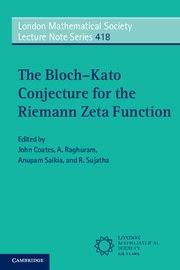
-
Select format
-
- Publisher:
- Cambridge University Press
- Publication date:
- 05 March 2015
- 13 March 2015
- ISBN:
- 9781316163757
- 9781107492967
- Dimensions:
- Weight & Pages:
- Dimensions:
- (228 x 152 mm)
- Weight & Pages:
- 0.46kg, 320 Pages
- Subjects:
- Mathematics (general), Mathematics, Number Theory, Algebra
- Series:
- London Mathematical Society Lecture Note Series (418)
You may already have access via personal or institutional login- Subjects:
- Mathematics (general), Mathematics, Number Theory, Algebra
- Series:
- London Mathematical Society Lecture Note Series (418)
Book description
There are still many arithmetic mysteries surrounding the values of the Riemann zeta function at the odd positive integers greater than one. For example, the matter of their irrationality, let alone transcendence, remains largely unknown. However, by extending ideas of Garland, Borel proved that these values are related to the higher K-theory of the ring of integers. Shortly afterwards, Bloch and Kato proposed a Tamagawa number-type conjecture for these values, and showed that it would follow from a result in motivic cohomology which was unknown at the time. This vital result from motivic cohomology was subsequently proven by Huber, Kings, and Wildeshaus. Bringing together key results from K-theory, motivic cohomology, and Iwasawa theory, this book is the first to give a complete proof, accessible to graduate students, of the Bloch–Kato conjecture for odd positive integers. It includes a new account of the results from motivic cohomology by Huber and Kings.
Contents
Metrics
Altmetric attention score
Full text views
Full text views help Loading metrics...
Loading metrics...
* Views captured on Cambridge Core between #date#. This data will be updated every 24 hours.
Usage data cannot currently be displayed.
Accessibility standard: Unknown
Why this information is here
This section outlines the accessibility features of this content - including support for screen readers, full keyboard navigation and high-contrast display options. This may not be relevant for you.
Accessibility Information
Accessibility compliance for the PDF of this book is currently unknown and may be updated in the future.


